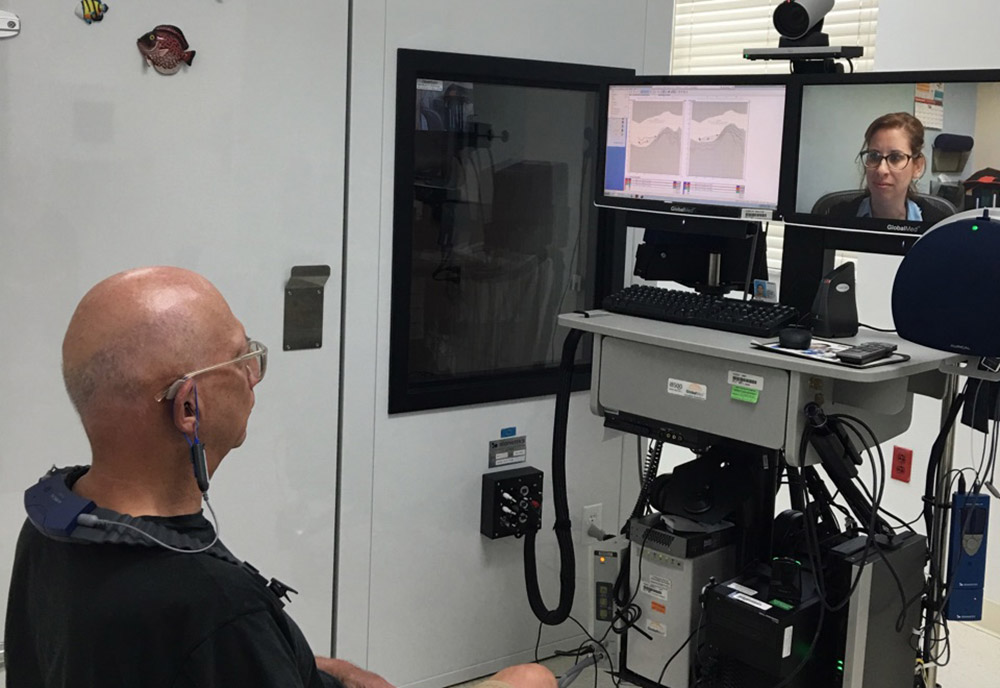Retired Army Major Jeffrey Weinstock has been wearing hearing aids for nearly 30 years after artillery fire during his service in Vietnam damaged his hearing. After moving to Key West from New York, he was expecting a difficult transition changing VA facilities and replacing his old hearing aids.
During his first visit to the Key West VA Outpatient Clinic, he was surprised. He was able to quickly and seamlessly transfer his VA health care to the Miami VA Healthcare System and even schedule lab and medical appointments. He met with Dr. Douglas Bond to discuss his health.
“I never felt rushed and felt he was really concerned about me and about my health,” Weinstock said.
Before making his third visit, Weinstock was worried he might have to make the 300-mile round trip—one that under the best traffic conditions can take three to four hours in one direction—from Key West to the Bruce W. Carter VA Medical Center in Miami to receive his audiology care. On Aug. 25, he went to the Key West VA’s Telehealth Audiology Walk-in Clinic and experienced his first Clinical Video Telehealth medical appointment.
Clinical Video Telehealth brings specialists to the Veterans and saves Veterans and their families the cost and inconvenience of traveling by road, rail or air to the nearest VA hospital. The Key West VA Outpatient Clinic is one of 700 VA community-based outpatient clinics nationwide using Telehealth technology to make diagnoses, manage care, perform check-ups, and deliver care to Veterans.
At the walk-in clinic, Weinstock met with Dr. Erica Dombrowsky, audiologist, and Lilith Brodsky, audiology resident, who were in Miami, through Clinical Video Telehealth.
He received a comprehensive hearing exam and ordered a new set of hearing aids the same day. Even though he had just met with a doctor who was more than 160 miles away, Weinstein said he didn’t notice a difference from an in-person audiology appointment and could tell Dombrowsky and Key West Telehealth Clinical Technician Pattianne Miller, really cared about him and his concerns.
“I have been so impressed with everyone I met, from the frontline administrative staff to my providers,” he said.

Jeffrey Weinstock and his wife, Elizabeth, both grateful for the support they received at the Key West VA Outpatient Clinic
His wife, Elizabeth, remembers his reaction when he returned from the clinic later that day.
“He came home so happy,” she said. “He had such wonderful things to say about everyone he encountered and worked with.”
Weinstock returned with his wife to the clinic and was fitted with the new hearing aids. Neither of them could believe everything had been accomplished in just three weeks. He was extremely pleased with the sound quality of the new devices and his ability to hear on his cell phone, something he had never been able to do with his older hearing aids.
“This is truly life-changing, and I couldn’t be more delighted with this experience. We are so grateful.”
To learn more about how VA is using Clinical Video Telehealth nationwide to care for America’s Veterans, visit www.telehealth.va.gov.
About the author: Jason Dominguez is a Public Affairs Specialist/Webmaster at the Miami VA Healthcare System and an OIF Army Veteran
Topics in this story
More Stories
The Medical Foster Home program offers Veterans an alternative to nursing homes.
Watch the Under Secretary for Health and a panel of experts discuss VA Health Connect tele-emergency care.
The 2024 National Veteran Suicide Prevention Annual Report provides the foundation for VA’s suicide prevention programs and initiatives.






